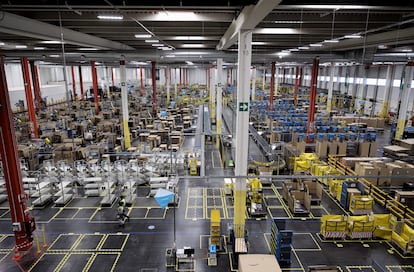Amazon won’t have to pay hundreds of millions in back taxes after winning EU case
Amazon was charged with unfairly profiting from special low tax conditions in Luxembourg, where its European headquarters are based. Almost three-quarters of Amazon’s profits in the EU were not taxed

Amazon won’t have to pay about 250 million euros ($273 million) in back taxes after European Union judges ruled in favor of the U.S. e-commerce giant Thursday, dealing a defeat to the 27-nation bloc in its efforts to tackle corporate tax avoidance.
The ruling by the EU’s top court is final, ending the long-running legal battle over tax arrangements between Amazon and Luxembourg’s government and marking a further setback for a crackdown by antitrust chief Margrethe Vestager.
The Court of Justice backed a 2021 decision by judges in a lower court who sided with Amazon, saying the European Commission, the EU’s executive branch, had not proved its case that Amazon received illegal state support.
“The Court of Justice confirms that the Commission has not established that the tax ruling given to Amazon by Luxembourg was a State aid that was incompatible with the internal market” of the EU, the court said in a press release.
Amazon welcomed the ruling, saying it confirms that the company “followed all applicable laws and received no special treatment.”
“We look forward to continuing to focus on delivering for our customers across Europe,” the company said in a statement.
The commission said it “will carefully study the judgment and assess its implications.”
The case dates back to 2017, when Vestager charged Amazon with unfairly profiting from special low tax conditions since 2003 in tiny Luxembourg, where its European headquarters are based. As a result, almost three-quarters of Amazon’s profits in the EU were not taxed, she said.
The EU has taken aim at deals between individual countries and companies used to lure foreign multinationals in search of a place to establish their EU headquarters. The practice led to EU states competing with each other and multinationals playing them off one another.
Sign up for our weekly newsletter to get more English-language news coverage from EL PAÍS USA Edition
Tu suscripción se está usando en otro dispositivo
¿Quieres añadir otro usuario a tu suscripción?
Si continúas leyendo en este dispositivo, no se podrá leer en el otro.
FlechaTu suscripción se está usando en otro dispositivo y solo puedes acceder a EL PAÍS desde un dispositivo a la vez.
Si quieres compartir tu cuenta, cambia tu suscripción a la modalidad Premium, así podrás añadir otro usuario. Cada uno accederá con su propia cuenta de email, lo que os permitirá personalizar vuestra experiencia en EL PAÍS.
¿Tienes una suscripción de empresa? Accede aquí para contratar más cuentas.
En el caso de no saber quién está usando tu cuenta, te recomendamos cambiar tu contraseña aquí.
Si decides continuar compartiendo tu cuenta, este mensaje se mostrará en tu dispositivo y en el de la otra persona que está usando tu cuenta de forma indefinida, afectando a tu experiencia de lectura. Puedes consultar aquí los términos y condiciones de la suscripción digital.








































